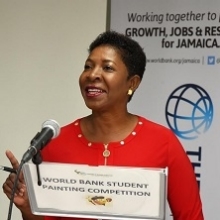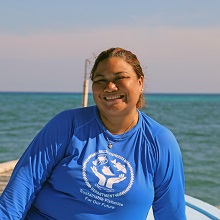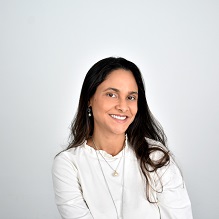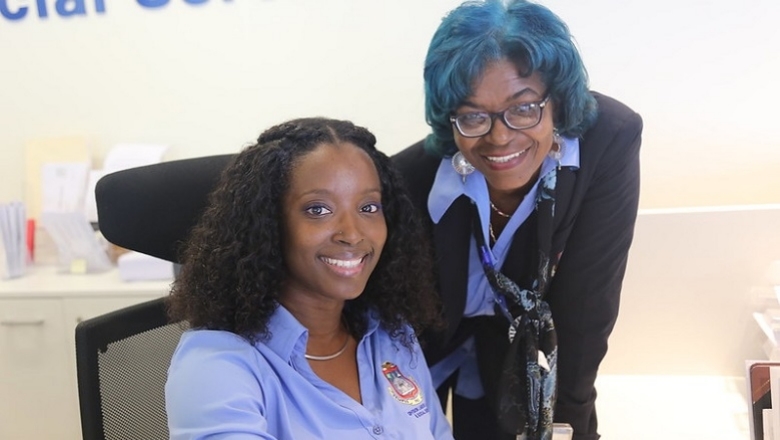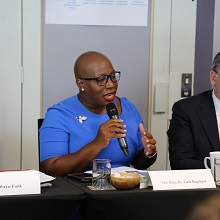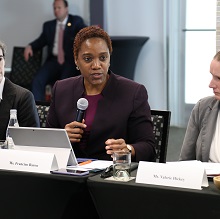Women have an essential role to play in order to build a Caribbean that is resilient and realizes its growth potential. The region has made substantial progress toward gender equality, particularly in women’s education achievement and joining the workforce. In a poll of our @WBCaribbean Twitter followers, 67.4% of respondents indicated that access to finance is still a barrier to women entrepreneurs, and 50% voted that harassment is a main barrier facing Caribbean women.
Societal norms and expectations can hinder progress needed, for example the glass ceiling, the “boy’s club” mentality in the workplace, and lack of family support in some cases. We spoke with several women from across the Caribbean about their careers, how they view the challenges ahead, and their advice for younger female professionals.
How did you get where you are today in your career?
Karlene Francis: I believe that (i) good parenting, (ii) excellent schooling in my formative years (iii) my faith, and (iv) good mentors have all contributed to my career path. My parents instilled the values of a good education, hard work, honesty, respect and doing my best at all times. They were not well-educated, so valued education for their children. My mother accompanied me to school during a pending hurricane so I could take an exam. She believed in me and trusted me wholeheartedly. I was the first in my family to go to university. I have also been very fortunate to have great male and female mentors who understood me and helped me to navigate throughout my career.
Karlene Francis is the Operations Officer at the World Bank in Jamaica, and Liaison Officer for Dominica and the OECS commission.
Nidia Chacon: I have been interested in the marine environment since I was a little girl. I was born and raised in Corozal Town [Belize], which is a town situated in the Bay. When I was a senior in high school, we had an organization doing research in Turneffe Atoll come to our high school to do a presentation on mangroves. They spoke about mangroves and scuba diving and I knew then I wanted to follow a career in science. However, my mother expected to see her daughter in an office working behind a desk in a uniform. She actually signed me up for a business degree. On the first day of school, I showed up and saw my name was not on the list of the science department. I told the business teacher, I’m sorry I’m not doing this course, and switched myself to science. It had to come from myself. I’m glad that I pushed. Even though I didn’t have their support at first, my parents are proud of me now, especially that I’m a role model for my family, pursuing what I dreamed of, working in the field. I’m married now, and when I first met my husband, I told him that this is something that I always wanted to do, and if he supported me the relationship could continue, but if he didn’t support me, I wasn’t going to give up my professional career for a family. Luckily, he supported me, and here I am now, still working in the field.
Nidia Chacon is the Senior Technical Officer for the Marine Conservation and Climate Adaptation Project, Belize Fisheries Department.
What do you see as the achievements of women in the Caribbean and where do we go from here?
Dr. Gale Rigobert: There is so much to celebrate in the Caribbean in terms of the strides women and girls have made in the field of science. We have found that increasingly women are working in those subject areas are holding their own, standing head and shoulders above their male peers, and doing so with grace. I want to congratulate the various agencies that have been involved in encouraginge more girls and women to get involved in science and science-based professions. Whether it be the Department of Sustainable Development, the Gender Unit, or the Ministry of Education, all these agencies come together to showcase women in science, raise their visibility, and do more to facilitate their participation in that field.
Dr. Gale Rigobert is the Minister of Education, Innovation, Gender Relations, and Sustainable Development for St. Lucia.
Karlene Francis: We have parity in terms of education and health. There are more women graduating from university now: 70% women and 30% men, and this is increasing. We have a lot of women in middle management. However, at the very top we have fewer women, and we also have a smaller percentage of women in Parliament. Just a few women have cracked the glass ceiling, so now there’s a need for women to have greater access to high level positions, and for women to network more. Usually men have wider networks, and there still exists a ‘boy’s club’ with regards to accessing finance and certain opportunities.
What are the biggest challenges facing women in the Caribbean?
Carmen Amaro: Here, as in many other countries, we work in environments that are highly ‘machistas.’ We are wired to think from a very early age that we are not as good as men. We develop low self-esteem, become risk-adverse, we grow up constantly doubting ourselves, and that’s a big challenge. We also have a very big portion of the population forced to grow up too early. They get married and get pregnant very young, and their chances to get ahead in life are reduced. The Dominican Republic is the country in the Western Hemisphere with the highest teenage pregnancy rates and that’s a huge challenge for women’s advancement.
Carmen Amaro is the Operations Officer at the World Bank in the Dominican Republic.
Francine Baron: We have quite a few single households headed by women – it is sometimes difficult for women to access finance to then build their businesses and invest in certain areas. So that is one area we need to look at – how can we make finance more readily available for women?
Francine Baron is the Principal Advisor to the Government of Dominica and Former Minister of Foreign Affairs.
Dr. Gale Rigobert: How can we make financing more accessible for women entrepreneurs? Very often women find themselves in microenterprises with limited collateral and accessing financing can sometimes seem daunting and onerous. Any policy intervention that includes a healthy package of financing accessible to women would make a huge improvement to ensure that our women really do feel economically empowered.
What advice would you give young Caribbean women just getting started in their career?
Carmen Amaro: Work on your soft skills, they are definitely a game-changer. Don’t be afraid to exercise a woman-like leadership style. We don’t necessarily have to lead the same way as men to be in positions of authority. Take risks. Take care of your freedom – don’t ever be afraid to be yourself and trust yourself.
Francine Baron: My advice is that one must try for excellence. One must strive to be the best in whatever area we are engaged in. We take advantage of the opportunities available to us, the technologies that are out there, and we should not take no for an answer. We should be determined to persevere no matter how difficult the challenges are. Know that others have done it and we can do it as well. Women are strong, they are multitaskers, and we should never believe that there is anything that is beyond us to achieve.
